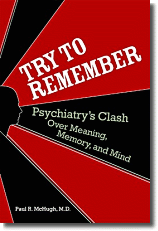 Paul McHugh is a University Distinguished Service Professor of Psychiatry at Johns Hopkins University. His book Try to Remember: Psychiatry's Clash Over Meaning, Memory, and Mind will be published in October.
Paul McHugh is a University Distinguished Service Professor of Psychiatry at Johns Hopkins University. His book Try to Remember: Psychiatry's Clash Over Meaning, Memory, and Mind will be published in October.At the Wall Street Journal, he named a five best list of "books about the factions and follies of psychiatry." One title from the list:
AbductedRead about another title on McHugh's list.
by Susan A. Clancy
Harvard, 2005
For decades, psychiatry has included a "far-out" faction that reliably turns to unusual sources in the pursuit of insight. The far-out crowd has embraced, among other things, mysticism, yoga and maharajahs and is usually headquartered in California. But inthe mid-1990s the Harvard psychiatrist John Mack registered the ultimate far-out claim: Many patients, he said, were in need of treatment because space aliens had abducted and abused them. Susan Clancy, a psychologist -- also at Harvard -- was moved to study these patients for several reasons, but in part because they were plentiful in Boston. In "Abducted," she describes how patients with a variety of vague and confusing symptoms, such as recurrent nightmares and sleep paralysis, found reports of alien abduction an interesting possible explanation for their troubles and were brought to believe in it through treatments that included hypnosis. Many of these patients, it turned out, were pleased by what they came to believe. Being abducted by aliens, they thought, meant that they were "chosen" or "privileged" as human representatives. Alas, Clancy draws an analogy to Judeo-Christian beliefs. I would have preferred to see her give a nod to the observation, usually attributed to G.K. Chesterton, that people who don't believe in God are liable to believe in anything.
--Marshal Zeringue





